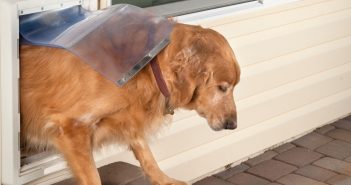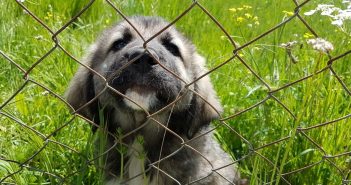by Gerry Ronson
The cause of lick granuloma has been linked to a genetic disorder and can be linked to insects. Dogs in some cases just keep licking an area such as a leg, groin, or tail until the hair has actually disappeared. When the hair disappears they begin to form little red bumps or lesions that become painful, swollen, and may bleed. In most cases it is thought that dogs suffering from lick granuloma do so due to excessive cleaning by the mother as a puppy. In most cases if the granuloma is left alone for a few days it will scab over and then heal. There are certain breeds more susceptible to this behavior than other dogs. These breeds are German shepherds, Doberman pinschers, Great Danes, Labradors, and Irish Setters.
Another treatment of course is treating the actual granuloma or lesion that has formed. In most cases you will need to keep the dog’s head away from the area until it is healed. Medication for anti- inflammation should be prescribed and given to the dog per the vet instructions. There are also medications for mood altering that have been known to help stop the behavior of over licking. You may also have to apply an antibiotic to the lesion to help it heal and avoid amputation of the limb. In severe cases a vet has had to remove the limb due to extreme infection, such as gangrene.
For the symptoms of a lick granuloma you should watch the behavior of the dog. If the dog is concentrating on one area every day, and for more than a few minutes they may suffer from this disorder. You will also find that the dog’s leg, tail, or groin area will be losing hair to where it becomes bald. The next symptom is going to be the formation of the lesion or sore. If the dog continues to lick in this area the lesion can begin to bleed. In some severe cases the dog has licked so rough in that area there has been bone fractures and nerve damage. Hopefully treatment and proper care have been sought before this occurs.
Dogs are wonderful creatures and when they have the proper care and affection they are the best pets. There are often times where a dog will be susceptible to a disease or contract some type of disease. You may have noticed that some dog breeds are more inclined to be ill than others. One of the most interesting dog diseases or more accurately disorders is the Lick Granuloma. The lick granuloma is a disorder characterized by over licking a particular area. There are several reasons for this issue to occur.
We mentioned two causes for this disorder. The other cause is physical rather than mental. This means you need to look for the cause of the symptoms such as lice, ticks, fleas, skin tumors, parasites, and allergies. Dogs that are susceptible to skin irritations and infections usually have lick granuloma disorder. So are there ways to prevent and treat this issue? Of course, the best prevention is to keep your dog well groomed and clean. If there are no bugs or parasites your dog will not suffer skin irritation issues. You can also make sure that as a puppy the dog is not over licking and the behavior is stopped before it becomes a real disorder. For treatment you usually remove the foreign body causing the issue or take them to a vet or trainer for behavior modification. This treatment method is subjective so it may not work for every dog.

Gerry Ronson is an expert author who writes about dogs. His vast expertise in the area comes from working with dogs for over 15 years. He has experience in all manor of subjects regarding dogs including training, care and re-homing. Gerry used his love and knowledge of dogs to set up dog accessories website that sells a range of quality dog products that include dog collars.




2 Comments
My chocolate Lab, Eris suffers from periodic bouts with lick granulomas. We have found that her’s is cause from separation anxiety. If she gets left outside for more than 5 minutes with out me she will lay at the back door and lick and lick until i let her in or come back to where she is at. If I leave the house for an extended period of time she will also ramp up her efforts. Its really sad to watch her lick herself into a granuloma in a matter of 10 minutes. We haven’t had any problems lately but she does have some ongoing problems after being used as an amish puppy mill breeder.
I see this issue all over the web and I guess people haven’t already heard about the new product, Anti-Lick Strips by Nurtured Pets. Their website is http://www.nurturedpets.com . It stops licking and chewing in pets and has proven to be just the case on my beagle Sammy! He started a lick granuloma on his paw and I was lucky enough to find this product. Bitter apple didn’t work (and I heard it was poisonous, not sure if it is or not???) and I felt bad putting an E-Collar on my dog.
http://www.nurturedpets.com